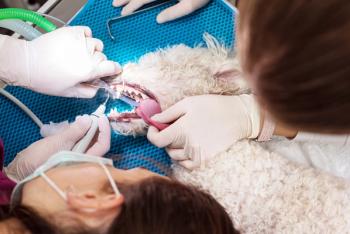
AVMA releases 2 videos informing pet parents on pet dental care
In honor of National Pet Dental Health Month the resources detail dental procedures and at-home oral care
The American Veterinary Medical Association (AVMA) is sponsoring National Pet Dental Health Month this February to raise awareness of the importance of pet oral care. In an association release,1 AVMA president Lori Teller, DVM, DABVP, shared regular dental exams are critical to a companion animal’s overall health care and can help prevent more serious health problems.
"Dental disease is one of the most frequently diagnosed health problems for our dogs and cats, and it can have serious consequences for our pets' health," expressed Teller in the release. "Left untreated, dental disease isn't just bad for your pet's teeth; it causes your pet pain. And dental disease is more likely to exacerbate heart, liver or kidney disease, as well as make it more difficult to regulate diabetes. These are just a few reasons why regular dental checkups are so important."1
Most dogs and cats have some evidence of periodontal disease by the age of three.2 To address this problem and help promote at-home dental care, the AVMA has unveiled 2 new videos: The first—
Daily toothbrushing is recommended for dogs and cats, however research published in the Journal of Veterinary Dentistry demonstrated that only 2% of dog owners engage in this practice.3 Also a survey of pet parents displayed that only 14% of dogs and 9% of cats receive dental care at the veterinarian's office.4 Pet owners and veterinarians should collaborate so the pets have an at-home oral care routine as well regular dental exams and professional dental cleanings.
In the release,1 Teller advises that a pet's teeth should be checked twice a year by their veterinarian or a board-certified veterinary dentist for early signs of a problem and to maintain a healthy mouth. However, if a pet's teeth display these signs, they should be taken in immediately:
- Bad breath
- Broken or loose teeth
- Extra teeth or retained baby teeth
- Teeth that are discolored or covered in tartar
- Abnormal chewing, drooling, or dropping food from the mouth
- Reduced appetite or refusal to eat
- Pain in or around the mouth
- Bleeding from the mouth
- Swelling in the areas surrounding the mouth
References
- AVMA: "Doggie breath" could be a sign of serious disease. News release. American Veterinary Medical Association. January 31, 2023. Accessed February 1, 2023. https://www.avma.org/news/press-releases/avma-doggie-breath-sign-serious-disease
- Pet dental care. American Veterinary Medical Association. Accessed February 1, 2023. https://ebusiness.avma.org/files/productdownloads/petdentalcare_brochure.pdf
- Quest BW. Oral health benefits of a daily dental chew in dogs. J Vet Dent. 2013;30(2):84-7. doi: 10.1177/089875641303000203.
- The 2017 - 2018 APPA National Pet Owners Survery Debut. American Psychological Association. 2017-2018. Accessed February 2, 2022. https://www.almendron.com/tribuna/wp-content/uploads/2018/06/gpe2017-npos-seminar.pdf
Newsletter
From exam room tips to practice management insights, get trusted veterinary news delivered straight to your inbox—subscribe to dvm360.




